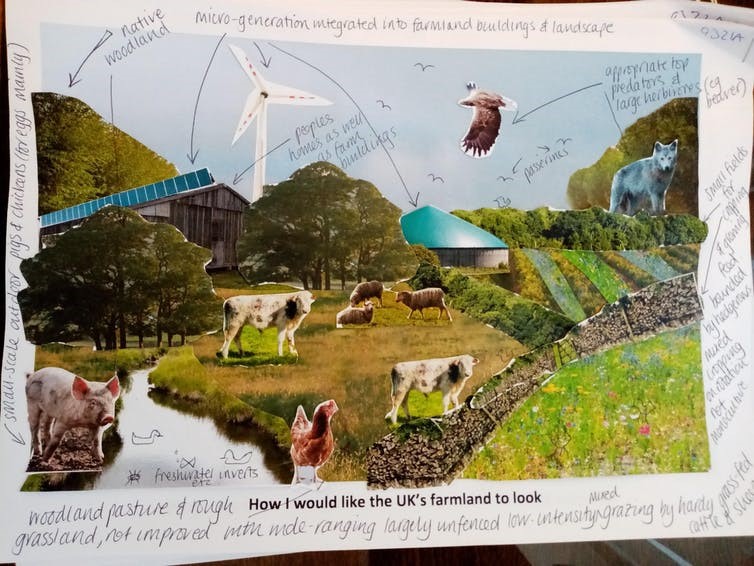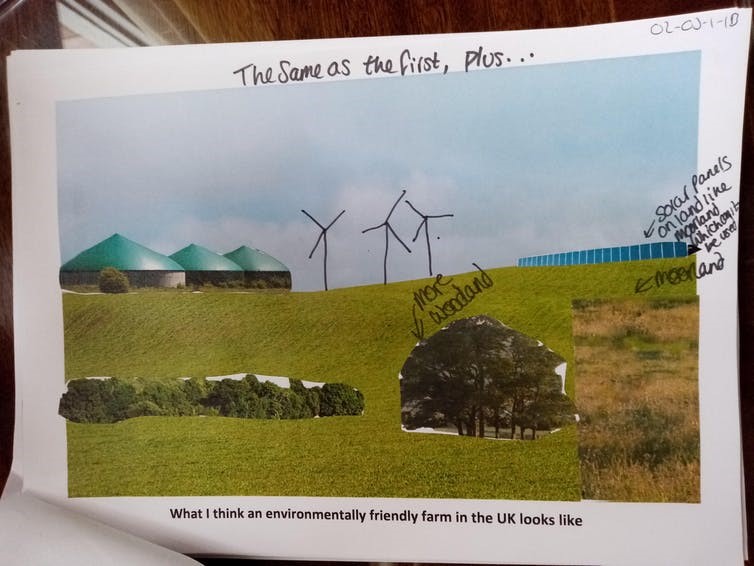There have been plenty of discussions surrounding how the UK farming subsidy system should change with the UK leaving the EU following the Brexit vote. There has been considerably little attention paid to the changes this might bring for the UK countryside, and what the public want the UK countryside to look like. In our recent paper, we looked to address this through the use of a national survey and innovative collage-making exercise.

The EU Common Agricultural Policy (CAP) has provided farmers with subsidies, traditionally based on how much land they managed, but in more recent revisions, on actions farmers take to provide several environmental benefits as well. Through Brexit, the UK has the opportunity to develop its own agricultural policies to shape the farming system. The 2020 Agriculture Bill will form the basis of the replacement of CAP payments for farmers, and looks to continue the push towards delivering environmental benefits by offering payment to farmers not only for the production of food but for the delivery of public goods such as habitat creation, soil protection and carbon storage. Switching from supporting farmers primarily for food production to focusing on more environmental benefits could significantly alter how UK farmland looks and functions. As the new schemes will be funded by taxpayers, the public should have a say in how the country’s farmland will be managed and looks.
So what do the UK pubic want from their countryside? We used two complementary methods:
1) A more traditional nationwide survey of 2,050 adults which asked participants to rate ten images of diverse UK farming landscapes, and;
2) A collage-creating exercise with 80 people, where they were asked to create two landscapes: firstly for an environmentally friendly farm, and secondly their ideal farm. This was designed to provide a creative way for individuals to demonstrate their vision of Britain’s farmed landscape, and allowed people to express their ideas and desires in ways that are hard to capture with surveys and verbal interviews.
Livestock: nice to look at, bad for the planet
What we found really surprised us. Whilst there were some differences in relation to socio-demographic characteristics, both the surveys and collages revealed that most people in the study liked seeing livestock in their ideal landscape. Yet many thought that for a farm to be environmentally friendly, it should have less livestock due to the greenhouse gas emissions they produce. Instead, most participants thought “green” farms should have lots of trees (good for the atmosphere and air pollution) and renewable energy installations, though many admitted that they didn’t like the look of wind farms. Interestingly, there was no significant difference in the kind of landscapes preferred by farmers compared with the rest of the public we surveyed.
Diversity, in relation to agricultural practices and increased biodiversity, was a key theme arising from the collages. Most of the people involved in the study said they were keen for farms to produce a mixture of food and benefits for the environment – such as carbon storage, wildflowers for insects to pollinate, and trees to improve air quality – rather than focusing on just food or environmental benefits. The majority of the people surveyed also wanted to increase food production in the UK rather than importing food from elsewhere.

What next for agricultural policy in the UK?
Our findings highlight the complexity involved in making green agricultural policy, touching on a few of the competing demands and trade-offs involved in producing food whilst still protecting the environment. For example, while most participants in our study stated that they were less interested in these landscapes producing cheap food, studies on buyer behaviour show that consumers, especially those on lower incomes, are mainly motivated by price when it comes to food. Finding the right balance will therefore be tricky. The UK government clearly has its work cut out devising policies that produce food in an environmentally friendly way at prices cheap enough to ensure retailers don’t source more food than necessary from abroad, essentially displacing any environmental savings that an improved farming system could offer the UK.
The research was undertaken by CRE colleagues Niki Rust, Francis Naab, Lucia Rehackova, Beth Clark and Sophie Tindale, alongside Amber Abrams (University of Cape Town), Courtney Hughes (Gov. of Alberta, Canada) and Bethann Garramon Merkle (University of Wyoming). The full paper can be accessed here.

